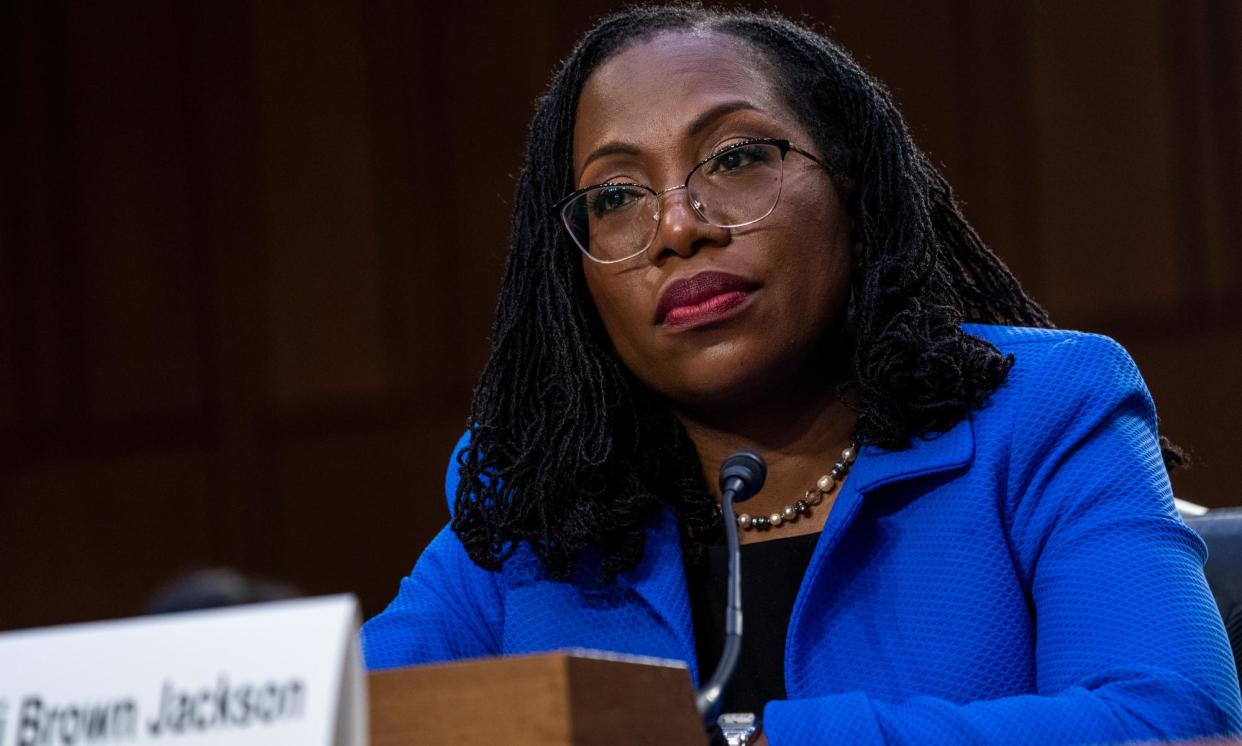Ketanji Brown Jackson pens fiery dissent in abortion ruling: ‘Facilitating suffering of people’

In a searing dissent Thursday, Justice Ketanji Brown Jackson slammed her fellow justices’ decision to dismiss the case over whether a state can ban abortions to protect women’s health, pointing out that the dismissal will drag out the case – and potentially endanger Americans.
“Will this court just have a do-over, rehearing and rehashing the same arguments we are considering now, just at a comparatively more convenient point in time?” Jackson asked in a dissent read from the bench, a move justices tend to only make when they feel particularly fired up.
“Or maybe we will keep punting on this issue altogether, allowing chaos to reign wherever lower courts enable states to flagrantly undercut federal law, facilitating the suffering of people in need of urgent medical treatment.”
Related: US supreme court to weigh in on transgender healthcare ban for minors
The case deals with whether Idaho’s abortion ban, which only permits abortions in cases where a woman’s life is in danger, violates a federal law known as Emergency Medical Treatment and Labor Act (Emtala). That law, which dates back the 1980s, requires hospitals that receive federal dollars – which is virtually all of them – to stabilize the health of patients who show up at their emergency rooms in the midst of medical emergencies.
The Biden administration had sued Idaho, arguing that its abortion ban forced doctors to break federal law by leading them to withhold abortions until women were on the verge of death. The supreme court initially issued an order allowing Idaho’s abortion ban to take full effect but, in its Thursday dismissal of the case as “improvidently granted” – indicating they should have never taken it on – the justices agreed to let Idaho doctors resume performing emergency abortions.
“We cannot simply wind back the clock to how things were before the court injected itself into this matter. Our intervention has already distorted this litigation process,” Jackson said in her dissent. “We permitted Idaho’s law to go into effect by staying the district court’s injunction in the first place, then allowed this matter to sit on our merits docket for five months while we considered the question presented.”
Letting the Idaho case continue to play out will also impact the rest of the US, Jackson added. Although many states that ban abortion permit the procedure to protect women’s health, a handful do have bans on the books that, like Idaho, only allow abortions to save a patient’s “life”. These bans could conflict with Emtala, according to briefing in the supreme court case by the Biden administration.
Notably, Texas has also already sued the Biden administration over Emtala. The state’s claim in that suit was that the landmark law protecting emergency abortion access was “an attempt to use federal law to transform every emergency room in the country into a walk-in abortion clinic”. Courts have since sided with Texas, blocking Biden administration guidance about Emtala and emergency abortions from taking effect in Texas.
The dismissal in the Idaho case does not impact the Texas litigation. The Texas Emtala case could land in front of the supreme court as early as next term, Nancy Northup, the president of the Center for Reproductive Rights, told reporters in a call on Thursday.
A final decision in the case may not arrive until after the November elections. If Donald Trump wins the presidency, his administration could decide to shift its priorities, change the executive branch’s interpretation of Emtala and stop litigating the case, according to Nicole Huberfeld, a health law professor at Boston University’s School of Public Health. If that happens, Idaho’s abortion ban may end up remaining as is.
“As someone who cares about access to care, this decision is just a temporary reprieve,” Huberfeld said. “It’s not the end of the line.”
Jackson effectively sided with the 6-3 vote to dismiss the case, in that she agreed with the move to let emergency abortions resume in Idaho but said she would not have dismissed it as improvidently granted. To the extent that Emtala is in conflict with Idaho’s ban, she wrote, the federal law trumps state law.
“This months-long catastrophe was completely unnecessary,” Jackson said.
She continued: “This court had a chance to bring clarity and certainty to this tragic situation and we have squandered it. And for as long as we refuse to declare what the law requires, pregnant patients in Idaho, Texas and elsewhere will be paying the price.”


